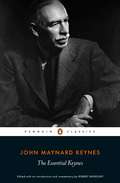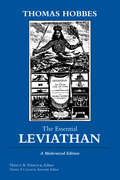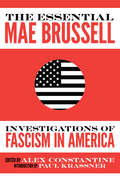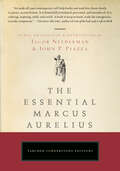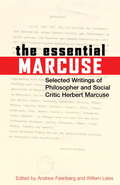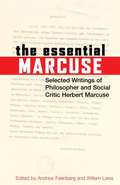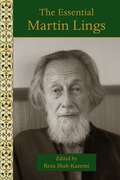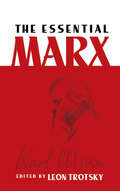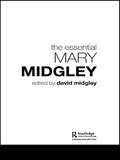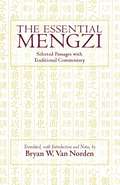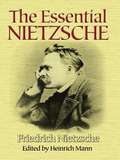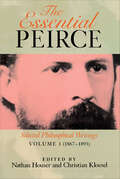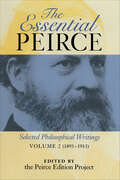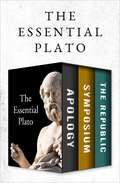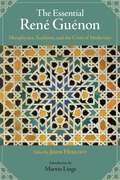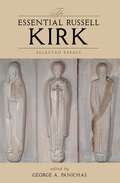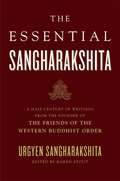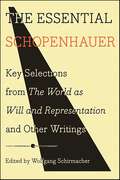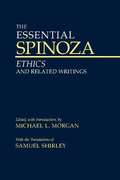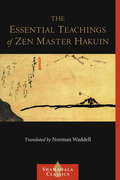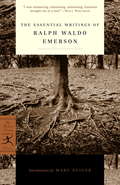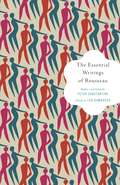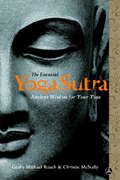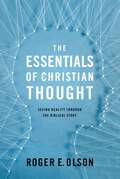- Table View
- List View
The Essential Keynes
by John Maynard Keynes Robert SkidelskyThe essential writings of the 20th century's most influential economist, collected in one volume Today, John Maynard Keynes is best remembered for his pioneering development of macroeconomics, and for his advocacy of active fiscal and monetary government policy. This uniquely comprehensive selection of his work, edited by Keynes's award-winning biographer Robert Skidelsky, aims to make his work more accessible to both students of economics and the general reader. All of Keynes's major economic work is included, yet the selection goes beyond pure economics. Here too are Keynes's essential writings on philosophy, social theory and policy, and his futurist vision of a world without work. As Robert Skidelsky writes in his introduction: "People talk of the need for a new Keynes. But the old Keynes still has superlative wisdom to offer for a new age."For more than sixty-five years, Penguin has been the leading publisher of classic literature in the English-speaking world. With more than 1,500 titles, Penguin Classics represents a global bookshelf of the best works throughout history and across genres and disciplines. Readers trust the series to provide authoritative texts enhanced by introductions and notes by distinguished scholars and contemporary authors, as well as up-to-date translations by award-winning translators.From the Trade Paperback edition.
The Essential Kierkegaard
by Howard V. Hong Edna H. Hong Søren KierkegaardDrawn from the volumes of Princeton's authoritative Kierkegaard's Writings series by editors Howard and Edna Hong, the selections represent every major aspect of Kierkegaard's extraordinary career. They reveal the powerful mix of philosophy, psychology, theology, and literary criticism that made Kierkegaard one of the most compelling writers of the nineteenth century and a shaping force in the twentieth. With an introduction to Kierkegaard's writings as a whole and explanatory notes for each selection, this is the essential one-volume guide to a thinker who changed the course of modern intellectual history. The anthology begins with Kierkegaard's early journal entries and traces the development of his work chronologically to the final The Changelessness of God. The book presents generous selections from all of Kierkegaard's landmark works, including Either/Or, Fear and Trembling, Works of Love, and The Sickness unto Death, and draws new attention to a host of such lesser-known writings as Three Discourses on Imagined Occasions and The Lily of the Field and the Bird of the Air. The selections are carefully chosen to reflect the unique character of Kierkegaard's work, with its shifting pseudonyms, its complex dialogues, and its potent combination of irony, satire, sermon, polemic, humor, and fiction.
The Essential Leviathan: A Modernized Edition
by Thomas Hobbes Nancy Stanlick Daniel P. ColletteThis edition of Leviathan is intended to provide the reader with a modestly abridged text that is straightforward and accessible, while preserving Hobbes' main lines of argument and of thought. It is meant for those who wish to focus primarily on the philosophical aspects of the work, apart from its stylish but often daunting early modern prose. The editors have updated language, style, punctuation, and grammar throughout. Very long, complicated sentences have been broken into two or more sentences for enhanced readability. In some instances, terms within a sentence are rearranged for enhanced clarity. Occasionally, an equivalent contemporary word is substituted for an archaic one. Ellipses indicate omissions of more than one sentence. Care has been taken to maintain the strength, nuance, and flavor of the work, especially of Hobbes' most difficult arguments. In addition, the volume offers a general Introduction and concise headnotes to each chapter. Annotation is geared to the student or novice reader. A glossary of key terms is also included, as well as an index.
The Essential Mae Brussell
by Paul Krassner Mae Brussell Alex Constantine"Mae's work may be more relevant now than in her heyday. Like those of many other freedom fighters throughout history, the ghost of Mae Brussell will never rest till justice is served."--Tim Cahill"The main Brussell thesis, if I dare risk commit the sin of summary on her complex work, was that an ex-Nazi scientist-Old Boy OSS clique in the CIA using Mafia hit men changed the course of American history by bumping off one and all, high and low, who became an irritant to them."--Warren Hinkle, San Francisco Examiner columnistThe Essential Mae Brussell is a compilation of chilling essays and radio transcripts by the seminal American anti-fascist researcher, famously supported by John Lennon and Yoko Ono.Mae Brussell was a married housewife with five children living in southern California before she took up the study of fascism in America. After the Kennedy assassination, she purchased the twenty-six-volume Warren Commission Report, and compiled, for herself, evidence that Lee Harvey Oswald was, as he maintained after his arrest, a "patsy." She had a regular radio broadcast on KLRB, an independent FM radio station in Carmel, California. She also published articles in Paul Krassner's the Realist, Hustler, People's Almanac, and the Berkeley Barb. In 1983, Mae's hour-long program shifted to KAZU-FM in Pacific Grove, California, and she remained on the air weekly until her final broadcast in June 1988. On October 3, 1988, at sixty-six, Brussell died of cancer.
The Essential Marcus Aurelius
by Jacob Needleman John P. PiazzaThis inaugural-and all new-Tarcher Cornerstone Edition presents a stunningly relevant and reliable translation of the thoughts and aphorisms of the Stoic philosopher and Roman emperor Marcus Aurelius, properly placing the philosopher-king's writings within the vein of the world's great religious and ethical traditions. The late antique world possessed no voice like that of Roman emperor Marcus Aurelius (121-180 CE). His private meditations on what constitutes a good life have withstood the centuries and reach us today with the same penetrating clarity and shining light as the words of Shakespeare, Emerson, or Thoreau. In this remarkable new translation, bestselling religious philosopher Jacob Needleman and classics scholar John P. Piazza have retained the depth of Marcus's perspective on life. They have carefully selected and faithfully rendered those passages that clarify Marcus's role as someone who stood within the great religious and ethical traditions that extend throughout every culture in human history. The voice that emerges from their translation is a universal one, equally recognizable to students of Christ, Buddha, the Vedas, the Talmud, and to anyone who sincerely searches for a way of meaning in contemporary life. .
The Essential Marcuse
by Andrew Feenberg William Leiss Herbert MarcuseThe Essential Marcuse provides an overview of Herbert Marcuse's political and philosophical writing over four decades, with excerpts from his major books as well as essays from various academic journals. The most influential radical philosopher of the 1960s, Marcuse's writings are noteworthy for their uncompromising opposition to both capitalism and communism. His words are as relevant to today's society as they were at the time they were written.From the Trade Paperback edition.
The Essential Marcuse: Selected Writings of Philosopher and Social Critic Herbert Marcuse
by Dan MckananThe Essential Marcuse provides an overview of Herbert Marcuse's political and philosophical writing over four decades, with excerpts from his major books as well as essays from various academic journals. The most influential radical philosopher of the 1960s, Marcuse's writings are noteworthy for their uncompromising opposition to both capitalism and communism. His words are as relevant to today's society as they were at the time they were written.
The Essential Martin Lings
by Martin LingsThis collection of the essential writings of Martin Lings brings together some of the most outstanding chapters from his wide range of works. In addition to selections dealing with the perennial philosophy, such as &“Do the Religions Contradict One Another?&”, the anthology includes sections from Lings' writings on Islam and Sufism, notably his magisterial account of the life of the Prophet Muhammad; his acclaimed biography of the Algerian Sufi master Ahmad al-ʿAlawi; his pioneering work on the Quranic art of calligraphy and illumination; and his celebrated translations (from the Arabic) of classics from the field of Sufi mystical poetry. Also featured are selections on the spiritual dimensions to be found in the mature plays of Shakespeare, such as Hamlet.
The Essential Marx: The Communist Manifesto
by Karl Marx Leon TrotskyShortly before he was assassinated in 1940, Leon Trotsky — one of Marx's most devoted converts and a key figure in the Russian Revolution — made this selection from Capital, to which he appended his own lengthy and insightful introduction. Compact and fascinating, this invaluable work not only presents Marx's thoughts in his own words but also places them in the swirling context of the 20th century. A critical analysis of ideas that have influenced millions of lives for well over a century, this book will be an important addition to the libraries of students and instructors of economics, history, government, and Communist thought.
The Essential Mary Midgley
by David MidgleyFeared and admired in equal measure, Mary Midgley has carefully yet profoundly challenged many of the scientific and moral orthodoxies of the twentieth century. The Essential Mary Midgley collects for the first time the very best of this famous philosopher's work, described by the Financial Times as 'common sense philosophy of the highest order'. This unrivalled introduction to a great philosopher and brilliant writer incorporates carefully selected excerpts from Mary Midgley's bestselling books, including Wickedness, Beast and Man, Science and Poetry, and The Myths We Live By. With a specially written foreword by James Lovelock, this classic text presents a superb and eminently readable insight into questions she has returned to time and again in her renowned sharp prose. This anthology discusses major topics, such as the roots of human nature, reason and imagination, the myths of science and the importance of holism in thinking about science and the environment.
The Essential Mengzi: Selected Passages with Traditional Commentary
by Bryan W. Van Norden MengziThe Essential Mengzi offers a representative selection from Bryan Van Norden's acclaimed translation of the full work, including the most frequently studied passages and covering all of the work's major themes. An appendix of selections from the classic commentary of Zhu Xi--one of the most influential and insightful interpreters of Confucianism--keyed to relevant passages, provides access to the text and to its reception and interpretation. Also included are a general Introduction, timeline, glossary, and selected bibliography.
The Essential Nietzsche
by Friedrich Nietzsche Heinrich MannA prominent intellectual of the Weimar era, Heinrich Mann was a leading authority on Nietzsche. This volume consists of Mann's selections of highlights from the philosopher's works, along with an introduction that explains their significance to modern readers.Key excerpts from Nietzsche's books include passages from The Birth of Tragedy, Thoughts Out of Season, The Dawn of the Day, The Joyful Wisdom, Thus Spake Zarathustra, Beyond Good and Evil, The Genealogy of Morals, The Case of Wagner, Nietzsche Contra Wagner, The Twilight of the Idols, The Antichrist, Ecce Homo, and The Will to Power. For ease of reference, Mann has arranged the text in sections corresponding to Nietzsche's views on science, philosophy, and truth; his critiques of culture -- the use and abuse of history, Europeans and Germans, Wagner, the genealogy of morals, and nihilism; his concept of the world without God, including the birth of tragedy out of the spirit of music, the true and the apparent world, and eternal recurrence; and his confessions.
The Essential Peirce, Volume 1: Selected Philosophical Writings (The Essential Peirce)
by Nathan Houser and Christian KloeselThe first of two volumes of key texts from American philosopher Charles Sanders Peirce, the father of pragmatism.“Often considered the greatest American philosopher, Peirce produced no comprehensive treatise; until now, students and scholars had to read through widely scattered papers to gain an overall view of his thought. This anthology remedies that situation by offering a full representation of his work, including several hard-to-obtain items. . . . Highly recommended for scholarly collections.” —Library JournalA convenient two-volume reader's edition makes accessible to students and scholars the most important philosophical papers of the brilliant American thinker Charles Sanders Peirce. Volume 1 presents twenty-five key texts, chronologically arranged, beginning with Peirce’s “On a New List of Categories” of 1867, a highly regarded alternative to Kantian philosophy, and ending with the first sustained and systematic presentation of his evolutionary metaphysics in the Monist Metaphysical Series of 1891–1893. The book features a clear introduction and informative headnotes to help readers grasp the nature and significance of Peirce’s thought system. Bringing together all the writings needed for the study of Peirce’s systematic philosophy and its development, Volume 1 is ideal for classroom use. Volume 2, covering the period from 1894 until Peirce’s death in 1914, will highlight the development of his system of signs and his mature pragmatism.“A first-rate edition, which supersedes all other portable Peirces. . . . All the Peirce most people will ever need.” —Louis Menand, The New York Review of Books“The Monist essays are included in the first volume of the compact and welcome Essential Peirce; they are by Peirce's standards quite accessible and splendid in their cosmic scope and assertiveness.” ―London Review of Books
The Essential Peirce, Volume 2: Selected Philosophical Writings (The Essential Peirce)
by Peirce Edition ProjectA collection of writings from the twenty-year period when many of Peirce’s philosophical papers were written for Open Court’s journal, The Monist.Volume 2 of this convenient two-volume chronological reader’s edition provides the first comprehensive anthology of the brilliant American thinker Charles Sanders Peirce’s mature philosophy. During his later years Peirce worked unremittingly to integrate new insights and discoveries into his general system of philosophy and to make his major doctrines fully coherent within that system. A central focus of Volume 2 is Peirce’s evolving theory of signs and its application to his pragmatism. Included are thirty-one pivotal texts, beginning with “Immortality in the Light of Synechism” (in which Peirce proposes synechism—the tendency to regard everything as continuous—as a key advance over materialism, idealism, and dualism) and ending with Peirce’s late and unfinished investigations of the relative merits of different kinds of reasoning. Peirce’s Harvard Lectures on Pragmatism and selections from A Syllabus of Certain Topics of Logic are among the texts included. This anthology is required reading for students and scholars wishing to follow Peirce’s development through to its conclusion and to appreciate the breadth of learning and wisdom of America’s greatest pragmatist.
The Essential Plato: Apology, Symposium, and The Republic
by PlatoThree Socratic dialogues by the ancient Greek philosopher who established the foundations of Western thought. Apology: In this classic text, Plato recounts the trial of his mentor Socrates, who stands accused of rejecting the gods and corrupting the youth of Athens. As recounted by Plato, Socrates defends himself with a profound examination of integrity, citizenship, the nature of truth, and the role of a philosopher. Symposium: Here Plato depicts a group of Athenian intellectuals discussing the nature of desire. One after another, Agathon, Aristodemus, Eryximachus, Pausanias, and Aristophanes share their perspectives on gender, love, sexuality, and human instincts. The dialogue culminates in the radical views of Socrates, who advocates transcendence through spiritual worship. The Republic: Plato&’s magnum opus is a wide-ranging and deeply influential meditation on society as a whole. Plato explores the concept of justice, the connection between politics and psychology, the difference between words and what they represent, and the roles of art and education, among many other topics.
The Essential Rene Guenon: Metaphysical Principles, Traditional Doctrines, and the Crisis of Modernity
by John HerlihyA prolific writer and author of over 24 books, Rene Guenon was the founder of the Perennialist/Traditionalist school of comparative religious thought. Known for his discourses on the intellectual and spiritual bankruptcy of the modern world, symbolism, tradition, and the inner or spiritual dimension of religion, this book is a compilation of his most important writings. A key component of his thought was the assertion that universal truths manifest themselves in various forms in the world's religions and his writings on Hinduism, Taoism, and Sufism are particularly illuminating in this regard.
The Essential Russell Kirk: Selected Essays
by Russell KirkAs the author of The Conservative Mind and other seminal books, Russell Kirk is usually thought of as one of the American conservative political movement&’s most important progenitors. But as this collection demonstrates, Kirk was perhaps at his best as an essayist. This volume also confirms that Kirk&’s was principally a literary and historical conservatism that refused to fit the irreducible complexity of human experience to the requirements of any ideological straitjacket. With The Essential Russell Kirk, literary critic George A. Panichas captures the breadth and depth of Kirk&’s intellectual project by gathering together forty-four of the most masterful of Kirk&’s essays, along with a unique chronology told in Kirk&’s own words and a substantial introduction that articulates the deep humanism that animated Kirk&’s philosophy. The result is a carefully assembled volume that gives us a fuller picture of an extraordinary man and writer, one whose labors had, and continue to have, remarkable repercussions on the American literary and political landscape.
The Essential Sangharakshita: A Half-Century of Writings from the Founder of the Friends of the Western Buddhist Order
by Emily Stout Urgyen SangharakshitaProfoundly knowledgeable and articulate, and equally at home with science, philosophy, myth, art, and poetry, Urgyen Sangharakshita uses every inner avenue to communicate the timeless Dharma to the Western mind. Engaging both the intellect and the heart countless times in a single chapter, the author draws remarkably apt examples from sources as diverse as Orwell, Aeschylus, and Jane Austen. This distilled volume is a primer to the breadth and depth of Buddhist thought and practice.
The Essential Schopenhauer: Key Selections from The World as Will and Representation and Other Writings (Harper Perennial Modern Thought Ser.)
by Arthur Schopenhauer“We should be grateful to Schopenhauer for managing to express the truth about life so beautifully.” —Alain De Botton, author of The Consolations of Philosophy“Schopenhauer’s philosophy has had a special attraction for those who wonder about life’s meaning, along with those engaged in music, literature, and the visual arts.” —Stanford Encyclopedia of Philosophy The Essential Schopenhauer delivers the first comprehensive English anthology of the seminal philosopher’s writings. Edited by Wolfgang Schirmacher, president of the International Schopenhauer Association, this indispensible collection affords readers a uniquely accessible gateway into the monolithic thinker’s prodigious body of work. Just as the Harper Perennial Basic Writings seriesrenders the work of Heidegger and Nietzsche accessible for English readers, The Essential Schopenhauer gives us unprecedented access to the complex ideas of this profound and influential thinker.
The Essential Spinoza: Ethics and Related Writings
by Michael L. Morgan Baruch Spinoza Samuel ShirleyDesigned to facilitate a thoughtful and informed reading of Spinoza's Ethics, this anthology provides the Ethics, related writings, and two valuable appendices: List of Propositions from the Ethics, which helps readers to trace the development of key themes; and Citations in Proofs, a list of all the propositions, corollaries, and scholia in the Ethics, together with all the definitions, axioms, propositions, corollaries, and scholia to which Spinoza refers in the proofs--thus, readers can locate, for a given item, each instance where Spinoza refers to it.
The Essential Teachings of Zen Master Hakuin: A Translation of the Sokko-roku Kaien-fusetsu
by Norman Waddell Hakuin EkakuA fiery and intensely dynamic Zen teacher and artist, Hakuin (1685-1768) is credited with almost single-handedly revitalizing Japanese Zen after three hundred years of decline. As a teacher, he placed special emphasis on koan practice, inventing many new koans himself, including the famous "What is the sound of one hand clapping?" As an artist, Hakuin used calligraphy and painting to create "visual Dharma"--teachings that powerfully express the nature of enlightenment. The text translated here offers an excellent introduction to the work of this extraordinary teacher. Hakuin sets forth his vision of authentic Zen teaching and practice, condemning his contemporaries, whom he held responsible for the decline of Zen, and exhorting his students to dedicate themselves to "breaking through the Zen barrier." Included are reproductions of several of Hakuin's finest calligraphies and paintings.
The Essential Writings of Ralph Waldo Emerson
by Ralph Waldo Emerson Brooks AtkinsonIntroduction by Mary Oliver Commentary by Henry James, Robert Frost, Matthew Arnold, Oliver Wendell Holmes, and Henry David Thoreau The definitive collection of Emerson's major speeches, essays, and poetry, The Essential Writings of Ralph Waldo Emerson chronicles the life's work of a true "American Scholar." As one of the architects of the transcendentalist movement, Emerson embraced a philosophy that championed the individual, emphasized independent thought, and prized "the splendid labyrinth of one's own perceptions." More than any writer of his time, he forged a style distinct from his European predecessors and embodied and defined what it meant to be an American. Matthew Arnold called Emerson's essays "the most important work done in prose." INCLUDES A MODERN LIBRARY READING GROUP GUIDEFrom the Trade Paperback edition.
The Essential Writings of Rousseau (Modern Library Classics)
by Leo Damrosch Jean-Jacques Rousseau Peter ConstantineNewly translated by Peter Constantine Edited and with an Introduction by Leo Damrosch The Essential Writings of Rousseau collects the best and most indispensable work of one of the world's most influential writers. A towering figure of Enlightenment thought, Jean-Jacques Rousseau was also one of that movement's most passionate and persuasive critics. His extraordinarily original observations on politics, education, and human nature were provocative in their day and remain resonant more than two hundred years after his death. Rousseau's 1762 treatise The Social Contract laid intellectual groundwork for both the American and French Revolutions, influencing such figures as Thomas Jefferson. An eloquent writer with profound insight into human psychology, Rousseau also penned one of the most compelling autobiographies ever written--the magisterial Confessions. The entirety of the first three books of that masterpiece along with the complete Social Contract are included in this indispensable volume. Paperback edition.
The Essential Yoga Sutra: Ancient Wisdom for Your Yoga
by Geshe Michael Roach Lama Christie McnallyThe Yoga Sutra of Patanjali is a classic Sanskrit treatise consisting of 195 "threads," or aphorisms, describing the process of liberation through yoga. Although little is known about Patanjali (most scholars estimate that he lived in India circa 200-300 b.c.), his writings have long been recognized as a vital contribution to the philosophy and practice of yoga. This new, expert translation of the original Sanskrit text of Patanjali's best-known work presents his seminal ideas and methods in accessible, plain-language English. Patanjali organized the sutra into four parts: Samadhi (absorption), Sadhana (practice), Vibhuti (supernatural powers), and Kaivalya (liberation). Each represents a step in breaking free of our limited definition of consciousness and training the mind to achieve oneness with the universe. Geshe Michael Roach, one of the most respected teachers of Tibetan Buddhism in America and a renowned scholar of Sanskrit, provides authoritative commentary on each of the sutras. His notes and clarification are straightforward and highly readable, untainted by obscure, academic terminology or New Age jargon. The first edition of the Yoga Sutra to present a Buddhist perspective, this paperback original will be welcomed by students and spiritual seekers alike.From the Trade Paperback edition.
The Essentials of Christian Thought: Seeing Reality through the Biblical Story
by Roger E. OlsonChristians disagree on doctrine, politics, church government, certain moral questions—just about everything under the sun, it can seem. Yet a unity remains, centered around a core outlook on God and the world that is common to all believers. Or at least, such an outlook should unite Christians of all theological and church backgrounds. However, alternate visions of reality often infect and corrupt Christians’ thinking. In The Essentials of Christian Thought, eminent theologian and church historian Roger Olson outlines the basic perspective on the world that all Christians, regardless of the place and time in which they are born, have historically held. This underlying metaphysic accords with all orthodox theologies, whether Calvinist or Arminian, Roman Catholic, Eastern Orthodox, or Protestant, but it separates Christianity from other religious and secular perspectives. It is, quite simply, the essential requirement of a Christian view of the world. Bold and incisive, The Essentials of Christian Thought will prompt thoughtful readers and students to more consciously appropriate the core of their faith, guarding against ideas that subtly but necessarily invite compromise.
